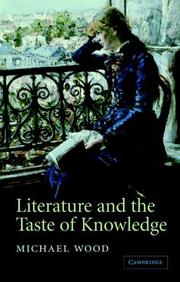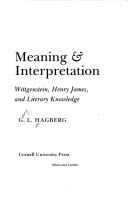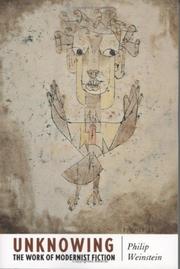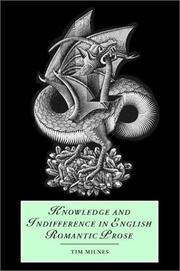| Listing 1 - 10 of 24 | << page >> |
Sort by
|
Book
Year: 2016 Publisher: [Place of publication not identified] : Nomos Verlagsgesellschaft mbH & Co. KG,
Abstract | Keywords | Export | Availability | Bookmark
 Loading...
Loading...Choose an application
- Reference Manager
- EndNote
- RefWorks (Direct export to RefWorks)
Der Band verfolgt ein epochenumspannendes, zugleich aber bildungspolitisch hochaktuelles Phänomen: Das Unnütze Wissen in der Literatur. Er geht anhand des in unserer selbsternannten ›Wissensgesellschaft‹ just vieldiskutierten und allzu affirmativ gehandelten Wissensbegriffs und dessen Nutzbarmachung dem konstitutiven Moment von Unnützem Wissen als ästhetisch produktivem Überschuss nach. Das Anliegen der Beiträge ist es, einen Begriff des Unnützen Wissens zu konturieren, der sich vom machtökonomischen Diskurs (Verwertbarkeit von Wissen) löst und aus dem dezidierten Zutrauen in Mittel und Wirkung der Literatur speist.
Book
ISBN: 1501705695 1501732927 9781501732928 Year: 2018 Publisher: Ithaca, NY
Abstract | Keywords | Export | Availability | Bookmark
 Loading...
Loading...Choose an application
- Reference Manager
- EndNote
- RefWorks (Direct export to RefWorks)
Merlin, the wizard of Arthurian legend, has been a source of enduring fascination for centuries. In this authoritative, entertaining, and generously illustrated book, Stephen Knight traces the myth of Merlin back to its earliest roots in the early Welsh figure of Myrddin. He then follows Merlin as he is imagined and reimagined through centuries of literature and art, beginning with Geoffrey of Monmouth, whose immensely popular History of the Kings of Britain (1138) transmitted the story of Merlin to Europe at large. He covers French and German as well as Anglophone elements of the myth and brings the story up to the present with discussions of a globalized Merlin who finds his way into popular literature, film, television, and New Age philosophy.Knight argues that Merlin in all his guises represents a conflict basic to Western societies-the clash between knowledge and power. While the Merlin story varies over time, the underlying structural tension remains the same whether it takes the form of bard versus lord, magician versus monarch, scientist versus capitalist, or academic versus politician. As Knight sees it, Merlin embodies the contentious duality inherent to organized societies. In tracing the applied meanings of knowledge in a range of social contexts, Knight reveals the four main stages of the Merlin myth: Wisdom (early Celtic British), Advice (medieval European), Cleverness (early modern English), and Education (worldwide since the nineteenth century). If a wizard can be captured within the pages of a book, Knight has accomplished the feat.
Knowledge, Theory of, in literature. --- Power (Social sciences) in literature. --- Merlin --- In literature.

ISBN: 0521606535 0521844762 9780521844765 9780511485367 9780521606530 0511130287 9780511130281 0511130880 9780511130885 051112872X 9780511128721 0511129351 9780511129353 0511485360 1280223936 9781280223938 1107152003 0511200587 0511300956 Year: 2005 Publisher: Cambridge, UK New York Cambridge University Press
Abstract | Keywords | Export | Availability | Bookmark
 Loading...
Loading...Choose an application
- Reference Manager
- EndNote
- RefWorks (Direct export to RefWorks)
What does literature know? Does it offer us knowledge of its own or does it only interrupt and question other forms of knowledge? This 2005 book seeks to answer and to prolong these questions through the close examination of individual works and the exploration of a broad array of examples. Chapters on Henry James, Kafka, and the form of the villanelle are interspersed with wider-ranging inquiries into forms of irony, indirection and the uses of fiction, with examples ranging from Auden to Proust and Rilke, and from Calvino to Jean Rhys and Yeats. Literature is a form of pretence. But every pretence could tilt us into the real, and many of them do. There is no safe place for the reader: no literalist's haven where fact is always fact; and no paradise of metaphor, where our poems, plays and novels have no truck at all with the harsh and shifting world.
Knowledge, Theory of, in literature. --- Knowledge, Theory of, in literature --- 82.04 --- 82.0 --- 82.0 Literatuurtheorie --- Literatuurtheorie --- 82.04 Literaire thema's --- Literaire thema's --- Knowledge, Theory of. --- Epistemology --- Theory of knowledge --- Philosophy --- Psychology --- Arts and Humanities --- Literature

ISBN: 9781501726972 1501726978 0801429269 9780801429262 150172696X 1501726986 Year: 1994 Publisher: Ithaca Cornell University Press
Abstract | Keywords | Export | Availability | Bookmark
 Loading...
Loading...Choose an application
- Reference Manager
- EndNote
- RefWorks (Direct export to RefWorks)
'What is the meaning of a word?' In this thought-provoking book, Hagberg demonstrates how this question-which initiated Wittgenstein's later work in the philosophy of language-is significant for our understanding not only of linguistic meaning but of the meaning of works of art and literature as well.
Book
ISBN: 1501711741 Year: 2018 Publisher: Ithaca, NY : Cornell University Press,
Abstract | Keywords | Export | Availability | Bookmark
 Loading...
Loading...Choose an application
- Reference Manager
- EndNote
- RefWorks (Direct export to RefWorks)
Philip Weinstein explores the modernist commitment to "unknowing" by addressing the work of three supreme experimental writers: Franz Kafka, Marcel Proust, and William Faulkner. In their novels, the narrative props that support the drama of coming to know are refused. When space turns uncanny rather than lawful, when time ceases to be linear and progressive, objects and others become unfamiliar. So does the subject seeking to know them. Weinstein argues that modernist texts work, by way of surprise and arrest, to subvert the familiarity and narrative progression intrinsic to realist fiction. Rather than staging the drama of coming to know, they stage the drama of coming to unknow. The signature move of modernism is shock, just as resolution is the trademark of realism.Kafka, Proust, and Faulkner wrought their most compelling experimental effects by undermining an earlier Enlightenment project of knowing. Weinstein draws on major Enlightenment thinkers to identify constituent components of the narrative of "coming to know"-the progressive narrative underwriting two centuries of Western realist fiction. The book proceeds by framing modernist unknowing between prior practices of realist knowing, on the one hand, and, on the other, certain later practices-postmodern and postcolonial-that move beyond knowing altogether. In so doing, Weinstein proposes a metahistory of the Western novel, from Daniel Defoe to Toni Morrison.
Knowledge, Theory of, in literature. --- Modernism (Literature) --- Fiction --- History and criticism. --- Faulkner, William, --- Proust, Marcel, --- Kafka, Franz, --- Criticism and interpretation.
Book
ISBN: 1443816523 9781443816526 1443897507 9781443897501 Year: 2016 Publisher: Newcastle-upon-Tyne, UK
Abstract | Keywords | Export | Availability | Bookmark
 Loading...
Loading...Choose an application
- Reference Manager
- EndNote
- RefWorks (Direct export to RefWorks)
Aesthetics. --- Knowledge, Theory of, in literature. --- Literature, Modern --- History and criticism. --- Kant, Immanuel, --- Influence. --- Criticism and interpretation.
Book
ISBN: 1438475985 1438475977 9781438475981 9781438475974 Year: 2019 Publisher: Albany, New York : Sunny Press,
Abstract | Keywords | Export | Availability | Bookmark
 Loading...
Loading...Choose an application
- Reference Manager
- EndNote
- RefWorks (Direct export to RefWorks)
"In An Ethic of Innocence, author Kristen Renzi provides a novel interpretative framework for reconsidering the epistemic claims of women in transatlantic literature from the late nineteenth century to the present. It is the first scholarly study of the ways in which gendered choices "not to know" have been represented, and critically received, within modern literature. The book grounds itself in the late nineteenth century's changing political and generic representations of women. Ultimately, it contends that these turn-of-the-century feminine figures who choose not to know, despite having been critically overlooked or dismissed as conservative or backward, can actually represent and model crucial pragmatic strategies by which modern and contemporary subjects navigate, survive, and even oppose gender oppression. Renzi offers a feminist theory of ignorance that sheds light on the misunderstood or overlooked epistemic practices of women in literature"--
Book
Year: 1994 Publisher: Ithaca : Cornell University Press,
Abstract | Keywords | Export | Availability | Bookmark
 Loading...
Loading...Choose an application
- Reference Manager
- EndNote
- RefWorks (Direct export to RefWorks)
Meaning (Philosophy) in literature. --- Knowledge, Theory of, in literature. --- Fiction --- History and criticism --- Theory, etc. --- Wittgenstein, Ludwig, --- James, Henry, --- Criticism and interpretation.

ISBN: 9781501711749 1501711741 0801443709 9780801443701 0801489733 9780801489730 9780801489709 Year: 2018 Publisher: Ithaca, NY
Abstract | Keywords | Export | Availability | Bookmark
 Loading...
Loading...Choose an application
- Reference Manager
- EndNote
- RefWorks (Direct export to RefWorks)
Philip Weinstein explores the modernist commitment to "unknowing" by addressing the work of three supreme experimental writers: Franz Kafka, Marcel Proust, and William Faulkner. In their novels, the narrative props that support the drama of coming to know are refused. When space turns uncanny rather than lawful, when time ceases to be linear and progressive, objects and others become unfamiliar. So does the subject seeking to know them. Weinstein argues that modernist texts work, by way of surprise and arrest, to subvert the familiarity and narrative progression intrinsic to realist fiction. Rather than staging the drama of coming to know, they stage the drama of coming to unknow. The signature move of modernism is shock, just as resolution is the trademark of realism.Kafka, Proust, and Faulkner wrought their most compelling experimental effects by undermining an earlier Enlightenment project of knowing. Weinstein draws on major Enlightenment thinkers to identify constituent components of the narrative of "coming to know"-the progressive narrative underwriting two centuries of Western realist fiction. The book proceeds by framing modernist unknowing between prior practices of realist knowing, on the one hand, and, on the other, certain later practices-postmodern and postcolonial-that move beyond knowing altogether. In so doing, Weinstein proposes a metahistory of the Western novel, from Daniel Defoe to Toni Morrison.

ISBN: 0521810981 0511064365 1107132509 0521035953 0511120176 0511058039 0511330553 0511484402 1280161043 1139147781 0511072821 9780511064364 9780511072826 9780511120176 9780521810982 9780511484407 9781280161049 9781107132504 9780521035958 9781139147781 9780511058035 9780511330551 Year: 2003 Volume: 55 Publisher: Cambridge, U.K. New York Cambridge University Press
Abstract | Keywords | Export | Availability | Bookmark
 Loading...
Loading...Choose an application
- Reference Manager
- EndNote
- RefWorks (Direct export to RefWorks)
This 2003 study sheds light on the way in which the English Romantics dealt with the basic problems of knowledge, particularly as they inherited them from the philosopher David Hume. Kant complained that the failure of philosophy in the eighteenth century to answer empirical scepticism had produced a culture of 'indifferentism'. Tim Milnes explores the way in which Romantic writers extended this epistemic indifference through their resistance to argumentation, and finds that it exists in a perpetual state of tension with a compulsion to know. This tension is most clearly evident in the prose writing of the period, in works such as Wordsworth's Preface to Lyrical Ballads, Hazlitt's Essay on the Principles of Human Action and Coleridge's Biographia Literaria. Milnes argues that it is in their oscillation between knowledge and indifference that the Romantics prefigure the ambivalent negotiations of modern post-analytic philosophy.
Apathie dans la littérature --- Apathie in de literatuur --- Apathy in literature --- Connaissance [Théorie de la ] dans la littérature --- Epistemologie in de literatuur --- Epistemology in literature --- Epistémologie dans la littérature --- Kenleer in de literatuur --- Kennisleer in de literatuur --- Kennistheorie in de literatuur --- Kentheorie in de literatuur --- Knowledge [Theory of ] in literature --- Théorie de la connaissance dans la littérature --- English prose literature --- Romanticism --- Knowledge, Theory of, in literature. --- Apathy in literature. --- History and criticism. --- 19th century --- History and criticism --- Great Britain --- Knowledge, Theory of, in literature --- Arts and Humanities --- Literature
| Listing 1 - 10 of 24 | << page >> |
Sort by
|

 Search
Search Feedback
Feedback About UniCat
About UniCat  Help
Help News
News